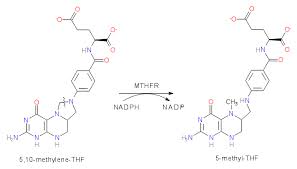If you’re diagnosed with a defect involving an abbreviated medical term with this many letters, things are bound to get a bit confusing. MTHFR stands for Methylenetetrahydrofolate reductase, it’s a mouthful all right. It’s an enzyme that plays a role in producing certain amino acids (the building blocks of protein), and is especially vital for converting the amino acid homocysteine into another amino acid, called methionine.
In relation to repeated miscarriage, the correlation between MTHFR (more at http://ghr.nlm.nih.gov/gene/MTHFR) and recurrent pregnancy loss is under great debate. Some researchers have looked at MTHFR gene mutations as a possible factor in recurrent miscarriages, while other studies have found no apparent link.
As it stands now, some doctors test for MTHFR in patients with history of miscarriage and offer aggressive treatment to everyone with MTHFR gene mutations. Others do not ever test for MTHFR variants. There is currently no official recommendation and no conclusive evidence about the value of testing for MTHFR gene mutations, so practice varies widely.
What is MTHFR Mutation and How is it a Problem?

Methylenetetrahydrofolate reductase (MTHFR) : image wikipedia
An abnormal change in gene structure, called a mutation, of the MTHFR gene can cause a disruption of the MTHFR enzyme’s normal function of breaking down homocysteine. If the MTHFR gene is malfunctioning due to mutations, homocysteine can build up and cause problems, both in the cardiovascular system and pregnancy.
Essentially what this means is that the genes that instruct MTHFR to convert homocysteine to Methionine are mutated and may not be capable of doing this important function. MTHFR is an enzyme that converts Homocysteine to an essential amino acid (Methionine).
When the genes are mutated you may be lacking this enzyme. Your Homocysteine levels can possibly climb making the blood clot. Some doctors don’t check for the MTHFR mutations and rely only on homocysteine levels. This isn’t as reliable as testing for the mutations, because Homocysteine levels fluctuate.
Elevated homocysteine in itself is considered a potential risk factor for miscarriages independently and can be caused by other factors beside MTHFR mutations.
How Does MTHFR Affect Pregnancy?
Some MTHFR mutations are more serious than others as far as their ability to cause problems during pregnancy. Specifically, women who have multiple pregnancy losses are more likely to have a MTHFR gene mutation.
As previously mentioned, The association of MTHFR and recurrent pregnancy loss is under great debate. Some clinicians and researchers feel that the mutations can cause blood clots between the developing placenta and uterine wall, thus preventing transport of vital nutrition to the developing fetus. This usually occurs early in pregnancy when the embryo or fetus is most vulnerable.
It is unlikely that the exact mechanism of how MTHFR affects pregnancy loss will be worked out in the near future. As a result, women and clinicians need to understand that there is no set “standard of care” protocol for dealing with recurrent miscarriage in the presence of a MTHFR mutation.
Treatments?
Many doctors prescribe Folgard, which is a prescription vitamin supplement containing high levels of folic acid, B12 and B6. These vitamins are what the body essentially needs to convert Homocysteine to Methionine.
Lowering the Risks
To reduce the risk of MTHFR defect, consider the following:
• Eat organic and non-GMO foods
• Reduce your intake of synthetic folic acid as the MTHFR enzyme does not convert it well to active methylfolate
• Increase natural food folates found in uncooked leafy greens
• Supplement with active forms of folate such as methylfolate and folinic acid
• Consider additional nutrients such as carnitine, CoQ10, DHA, krill oil. Probiotics, vitamin C, magnesium and phosphatidylcholine
• Eat well-balanced meals with protein
• If vegan, talk with your doctor about supplementing with methylcobalamin, an active form of vitamin B12, along with soy lecithin. One in five women are deficient in choline, which is a critical nutrient for brain development.
Should I Get Tested for MTHFR Mutation?
Although medical experts are in disagreement regarding the necessity and the value of performing MTHFR mutation test, we strongly recommend those wanting to become parents to consider screening for MTHFR genetic defect prior to conception. The possible consequences of a poorly functioning or mutated MTHFR genes can be considered ‘grave.’
Recurrent pregnancy loss, preeclampsia, child with Down Syndrome, child with autism, intense postpartum depression are some of the possible risks associated with MTHFR defect. It’s therefore wise to take the appropriate test to hopefully reduce the chances of such risks from occurring.



 Saving...
Saving...